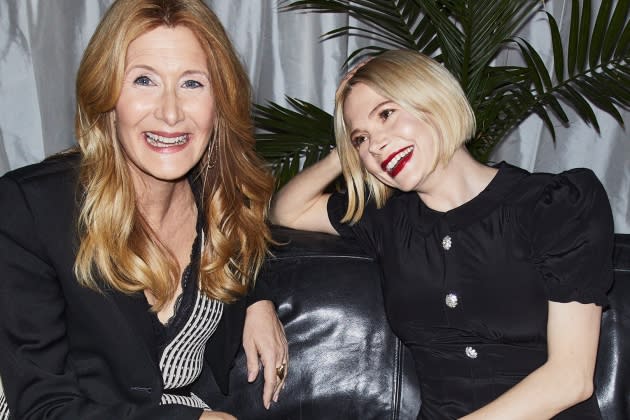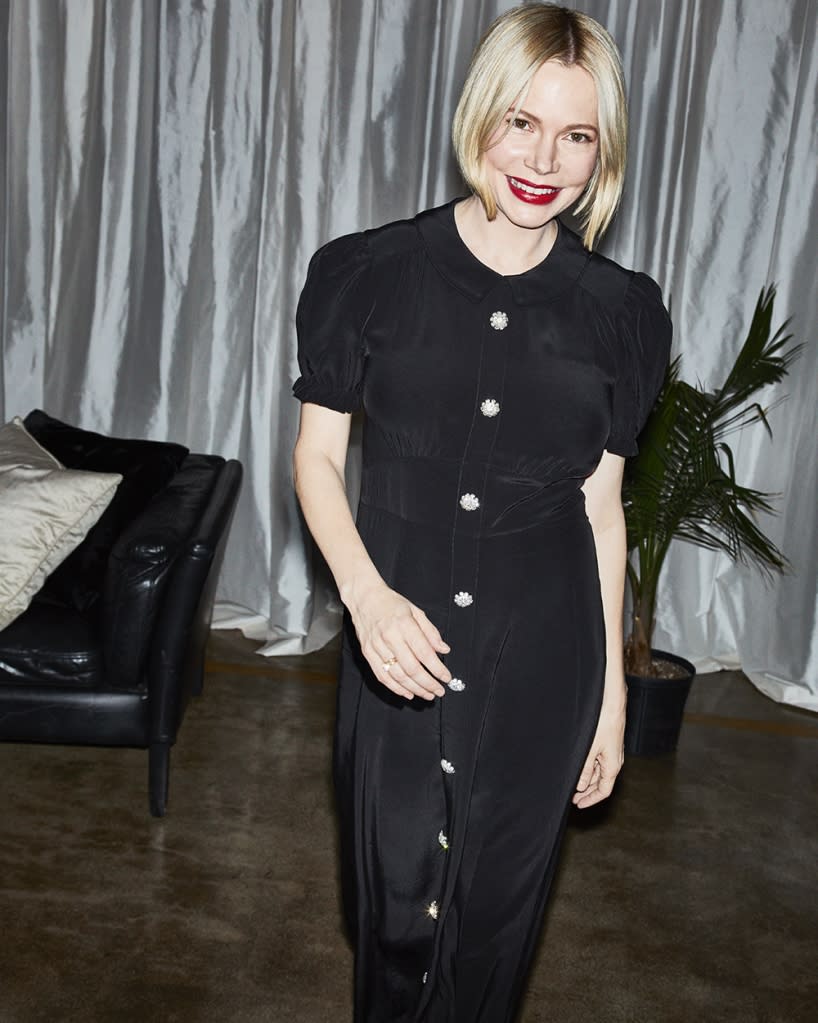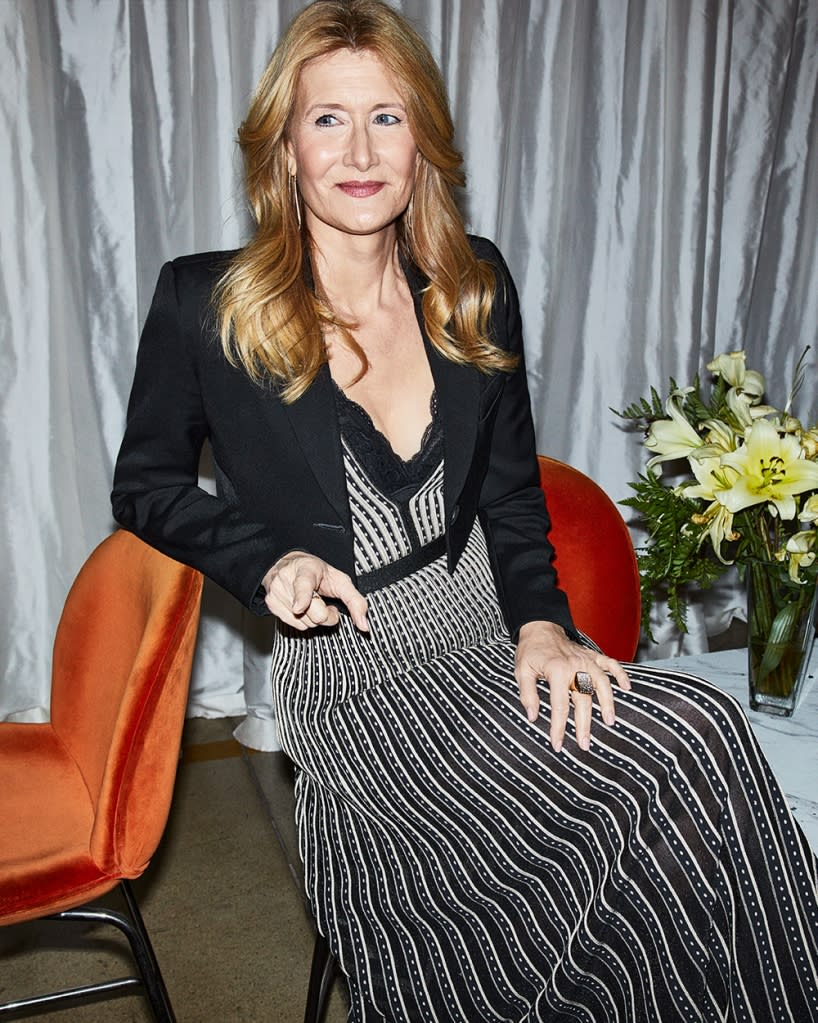Laura Dern and Michelle Williams on Spielberg’s Genius, Improvising With ‘Jurassic World’ Dinosaurs and Not Wanting to Raise Child Actors
- Oops!Something went wrong.Please try again later.
- Oops!Something went wrong.Please try again later.
- Oops!Something went wrong.Please try again later.
- Oops!Something went wrong.Please try again later.
- Oops!Something went wrong.Please try again later.

Michelle Williams and Laura Dern both play mothers in their latest films. In Williams’ case, she portrays the troubled, exuberant Mitzi in “The Fabelmans,” Steven Spielberg’s autobiographical portrait of his teenage years (his avatar, Sammy, is played by Gabriel LaBelle). In “The Son,” Dern’s Kate is desperately seeking ways — alongside her ex-husband, Peter (Hugh Jackman) — to help her depressed son, Nicholas (Zen McGrath).
Heavy stuff, to be sure. But in the conversation between Dern and Williams, these weighty subjects are discussed with intention and with love — some of which is directed toward Spielberg, to whom both actors are bonded. For Dern, that relationship dates back to 1993’s “Jurassic Park.” And she even helped cast a key role in “The Fabelmans” by reaching out to her good pal David Lynch.
More from Variety
How Oscar Nominees Found the Key to Projects Close to Their Directors' Hearts
Laura Dern to be Honored at French Cinematheque Ahead of 'The Son' Local Premiere
Michelle Williams: You already gave me the chills.
Laura Dern: Because I’m making you be my friend, and said, “You have to have dinner with me.”
Williams: That’s what gave me the chills.
Dern: I just have so many questions about “The Fabelmans,” and I want to hear from you what it was like, not only working with Steven Spielberg, who we both get to share and love him so much, but playing Steven’s mother, Mitzi. I had the privilege of knowing his mom, and she was such an incredible person. The way she entered every room and the way she championed everyone in the room at all times is held so profoundly by you in your performance. So I just love that he found someone that felt so safe to take on his soul-healer mama. What an intimate thing!

Williams: When we first Zoomed, I didn’t know why he wanted to speak to me. He’s explaining his life story, who his mother was, what she meant to him. And then it dawned on me, what he was asking. And I said, “If I’m hearing you correctly, you want me to play your mom?” And he said, “Oh, yeah. That’s exactly what I’m asking.” And I said, “OK.” I have worked my whole life to feel able to say yes and be ready and capable, when that request is made, to say, “I can and I will — and let’s go.”
It was a very emotional day in the household for me, for my husband, for my daughter — everybody. We were just all so excited.
Dern: I’m assuming people will carry different experiences of what her journey was, what her struggle was, what she was dealing with on a mental health level because of her heartbreak. But I wonder how you saw her — how you guys spoke about her, and reinvented those moments from his childhood that were so devastating.
Williams: It’s so delicate because, in telling the story truthfully, he never wanted to expose the person that he loved to judgment — to expose the thing that really haunted her whole life. For me, when I read it, I never judged her. I just saw, wow, they’ve really let this person breathe. When you live a liberated life, you give that gift to your children passively. It’s not even a lesson you have to teach them.
Dern: That’s so beautiful.
Williams: Did you feel passionately about acting when you were young? Because we both started so incredibly young.
Dern: You were … ?
Williams: 12.
Dern: I was 11. Isn’t that crazy?
Williams: It’s crazy when you think about your own children, and you think about them being in these environments. And you’re like, “Well, no. Not in a million years.”

Dern: Jaya’s interested, and I’m like, “We can talk about it when you’re 18,” which I remember my mother saying to me.
Williams: I’ve always thought about childhood as being this really fertile time that, if it’s done correctly, you can keep drawing from it your whole entire life. There was a very short period in my childhood that I feel that way about; it’s my childhood in Montana and the feeling of freedom.
Dern: And were you just in wild country?
Williams: We were. I said to my mom, “I have this memory of riding bareback on a horse and I’m 8 and I’m galloping, but that can’t be true.” And she said, “Oh, no, it is. Because your grandfather felt that saddles were dangerous. He’d seen too many people fall off a horse and get dragged because their feet were still stuck in the stirrups.”
Dern: That’s incredible.
Williams: That’s what I want. I want that feeling again.
Dern: How was working with Gabe, who is playing young Steven Spielberg?
Williams: This has taken me my entire life to be prepared for — and he was 18 and walked on that set just so confident. And Spielberg’s giving him direction, and Gabe’s challenging it at times. And I’m like, “Just say yes. Just say, ‘Yes, sir!’” He was like, “Well, I don’t know if I would …” I was like, wow.
How do you feel when you work with young performers?
Dern: I do feel responsible, don’t you? And in “The Son,” this boy, Zen McGrath, also 18, had never made a movie. He’s playing a boy in a severe mental health crisis and had to be completely broken and in despair in many ways. But I worried for him because he was having to go there and expose the unspoken — which is mental health. He was looking at that for himself and for all of us. So I felt so protective.
Williams: And all without rehearsal, is that right?
Dern: Yeah. And there’s one scene in our movie, which is Hugh Jackman and I are divorced and we meet at a restaurant. It was a 10-page scene, and such an incredibly written scene. And I really felt so grateful that nothing was rehearsed. Just allowing him to even find me in the restaurant and figure out how to sit. And the discomfort of ordering drinks because it’s your ex, and how certain lines would be said. It’s such a moving thing to discover later, when you just come in with your own emotional life. I was really excited by that, and hope to have the opportunity to do that more and more on films.
How was it with Steven? Did you rehearse a lot?
Williams: We didn’t do anything. That first day that you show up, you just sort of cross your fingers and you hope that your preparation has led you down the right path and that you’re going to hold hands and walk through it together, but you just don’t know. But it’s also exciting, that feeling.
Dern: And how elated he gets when he has what he needs, Steven.
Williams: Has he always been like that?
Dern: Always. Working with Steven on “Jurassic Park”; I mean, he was inventing with ILM, which was new technology, and there was so much to oversee and discover. And yet there was never a moment that wouldn’t make him giddy, from a prop working to some wonderful opportunity that an actor offered. And always improvising — which is crazy that “Jurassic Park” is probably one of my biggest memories of improvisation. He loves it. He’s already cut his movie in his head and yet gives you all the room.
Williams: It’s so true. He’s already cut the movie in his head, but you don’t feel like that. Space, freedom, play, invention, anything goes.
Dern: Ready to shift the plan! And John Ford, which we have to talk about, was just the greatest thing that ever happened.
Williams: Thanks to you. And how did you convince somebody to say yes?
Dern: To just feel invited into Steven’s sacred space of “I want David Lynch to play John Ford.” I was like, “Oh, he’s not going to want to be in a movie, I don’t think.” But Steven was so determined and asked if I would help with an invitation. And they spoke, and then I luckily became a bit of a mediator of promising David he could do it. And I even got to read the scenes with him and talk about his wardrobe and just listen to the process once he agreed to do it. David worships John Ford like Steven does.
I haven’t told Steven this story yet, but it made me laugh so hard. I said, “I’ve always wanted you to be friends. You remind me of each other in such completely different ways.” And David said, “It’s true. We have this thing in common. We have a vision and we have to make our vision. Steven goes out there and he has an idea, and a million people have that same love of that vision.” And he goes, “It’s the same with me. I have a vision and I make it — and hundreds of people have that.”
Williams: Wow. What a marriage you’ve made for cinema and their lives. What a mitzvah.
Set Design by Jack Flanagan
Best of Variety
'House of the Dragon': Every Character and What You Need to Know About the 'Game of Thrones' Prequel
25 Groundbreaking Female Directors: From Alice Guy to Chloé Zhao
Sign up for Variety’s Newsletter. For the latest news, follow us on Facebook, Twitter, and Instagram.

